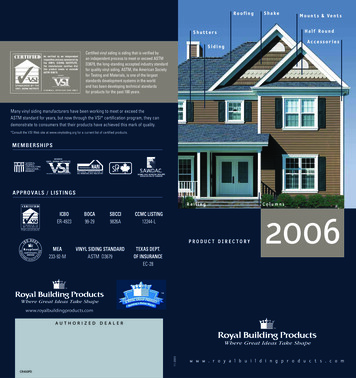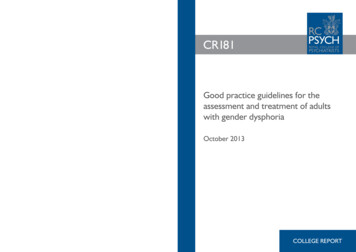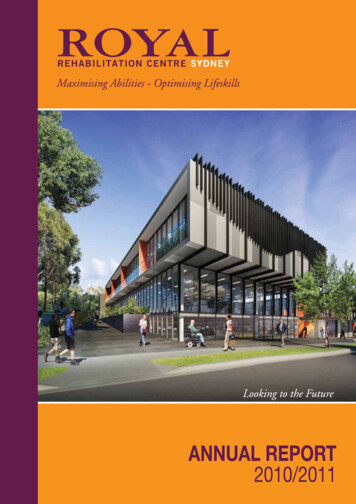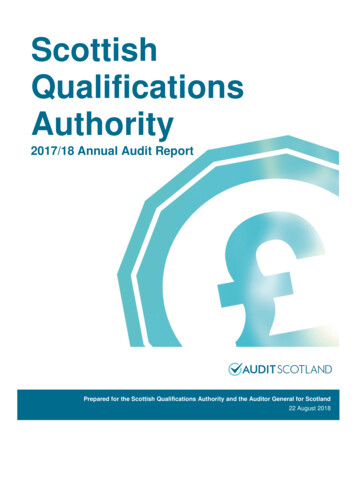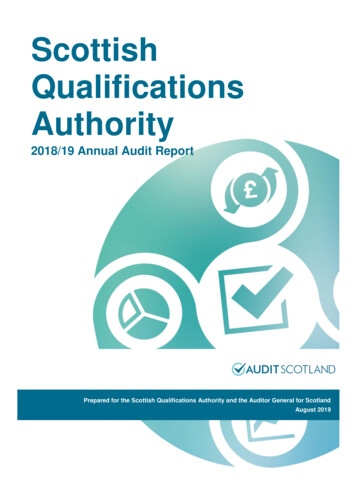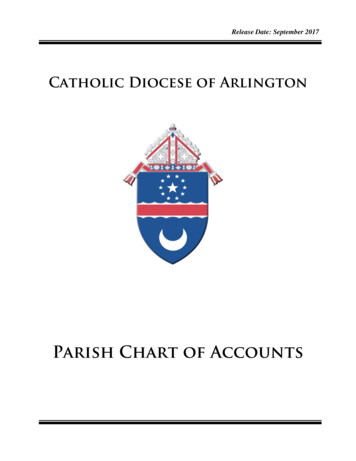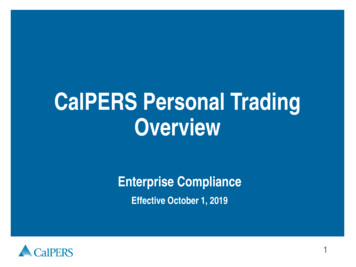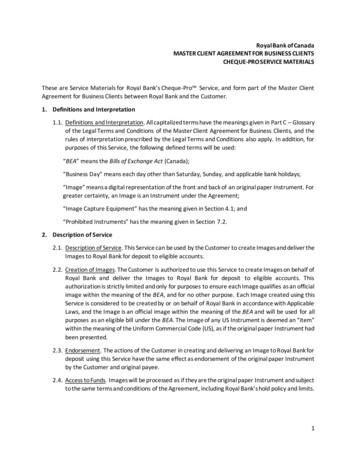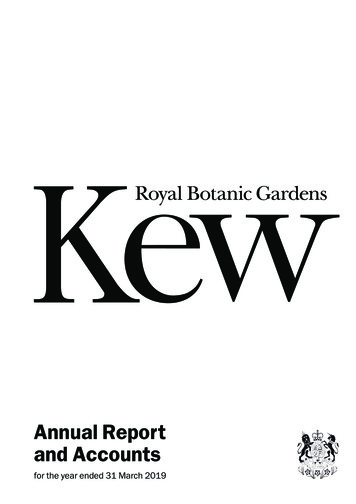
Transcription
Annual Reportand Accountsfor the year ended 31 March 2019
Royal Botanic Gardens, KewAnnual Report and Accountsfor the year ended 31 March 2019Presented to Parliamentpursuant to Paragraphs 39(7) and 40(4)of Schedule 1 of the National Heritage Act 1983Ordered by the House of Commons to be printedon 18 July 2019HC 2455
Board of Trustees of the Royal Botanic Gardens, Kewcopyright 2019The text of this document (this excludes, where present,the Royal Arms and all departmental or agency logos)may be reproduced free of charge in any format or mediumprovided that it is reproduced accurately and not in amisleading context.The material must be acknowledged as Royal BotanicGardens, Kew copyright and the document title specified.Where third party material has been identified, permissionfrom the respective copyright holder must be sought.Any enquiries related to this publication should be sent toinfo@kew.org.This publication is available athttps://www.gov.uk/official-documentsISBN 978-1-5286-1132-9CCS 031987059007/19Printed on paper containing 75% recycled fibre content minimumPrinted in the UK by APS Group on behalf of the Controller of HerMajesty’s Stationery OfficeRoyal Botanic Gardens, Kew Annual Report Accounts 2018–19 2
Contents4Foreword15 Governance and internal control issues5Management commentary16 Sustainability report5Highlights and challenges6Measuring success19 Statement of Trustees and Accounting Officerresponsibilities7Notes on Performance8Customer care statement8Health and safety statement8Diversity, Inclusion and Equality statement9Outreach programme9Volunteering statement9Third party engagement9Safeguarding10 Governance statement10 Governance arrangements12 Board and Committee attendanceRoyal Botanic Gardens, Kew contact detailsThe DirectorRoyal Botanic Gardens, KewThe HerbariumKew GreenRICHMONDTW9 3AEUnited KingdomEmail: info@kew.orgTel: 44 (0) 20 8332 5000www.kew.org19 Statutory information22 Remuneration report25 Auditor’s certificate and report27 Consolidated statement of financial activities28 Balance sheets29 Consolidated cash flow statement30 Notes to the accountsAnnex RBG Kew five-year financial summary
Foreword2018-19 has proved to be an eventful year for RBG Kew.In May Sir David Attenborough re-opened the TemperateHouse, the largest Victorian glasshouse in the world. Morethan 1,000 people were involved in the restoration, 15,000panes of glass were replaced and 180km of scaffolding wereneeded. The result is a magnificent building restored to itsformer glory and updated to improve lighting and ventilationfor the 10,000 temperate plants housed within it. The projectrelied on the generosity of the Heritage Lottery Fund, oursponsor department Defra and other benefactors. Our sincerethanks go to all involved in helping to achieve this project.The re-opening of the Great Pagoda followed in July after anextensive restoration by Historic Royal Palaces to return thisiconic building to its original Georgian splendour. We weredelighted that our Patron HRH Prince of Wales was able toattend the official re-opening event in July.In September we published our first State of the World’sFungi report which generated widespread media interest bothnationally and internationally. The key message from the reportand symposium is that with just 5% of the estimated 3.8mfungi species identified we need to continue to promote theimportance of mycological research to unlock the potential ofthis incredibly important kingdom. We also worked on year oneof implementing the Science Collections Strategy, our first suchstrategy, which was published in March 2018.We were delighted to win a Gold medal at the RHS ChelseaFlower Show for our Action Oak stand. Launched by the Secretaryof State for Environment, Food and Rural Affairs Michael Goveand the Parliamentary Under Secretary of State, Lord Gardiner ofKimble, Action Oak aims to bring people together to protect ournative oak trees from pest and disease threats.We completed the new Arboretum Nursery, which providesmuch improved nursery facilities and which allows behind-thescenes access for visitors to observe plant propagation andconservation. Work continued on the Children’s Garden and onthe Pavilion restaurant, both of which opened in May 2019.At Wakehurst we replaced and re-opened the WetlandsBoardwalk, a conservation area for wetlands plants, birdsand insect life. The Winter Garden was also completed,which is a contemporary re-shaping and enlargement of oneof the UK’s first winter gardens. These are two importantmilestones in the rejuvenation of the Wakehurst landscape.We continued to consolidate our finances in 2018-19. Thisreflects strong sales at both Christmas at Kew and ourlantern festival at Wakehurst, Glow Wild. Both retail andcatering have performed well this year and our Kew gin pickedup three medals at the 2018 International Wine & Spritawards. Day-paying admissions were 14% ahead of last yearwhilst income from day-paying visitors has increased by 28%year on year; 26% of day-paying admissions are now bookedonline. At Kew Gardens we welcomed almost two millionvisitors. Whilst this performance is heartening, growing visitornumbers puts pressure on visitor facilities which requiresignificant investment, and we continue to need to invest inour science research and collections facilities.The Kew International Medal was this year awarded to MaryRobinson, first female President of Ireland and leadingadvocate for environmental and human rights, for her work onfood security and climate justice. In a rousing speech at theaward ceremony in March, the former head of state reflectedthat: ‘Climate change is not just an issue of atmosphericscience or plant conservation; it is also about human rights.Climate change undermines the enjoyment of the full rangeof human rights – from the right to life, to food, to shelter andto health.’ This year we also launched our Kew Ambassadorsprogramme which aims to bring together influential individualsto raise awareness internationally about RBG Kew’s missionto be the global resource for plant and fungal knowledge.We were sorry to say goodbye to Professor Kathy WiIlis, ourfirst Director of Science, who left in September to take upthe role of Principal at St Edmund Hall, at Oxford Universityhaving completed her five-year secondment to RBG Kew. Kathymade a huge contribution to the quality and impact of KewScience, in recognition of which she was awarded a CBE in the2018 Birthday Honours. We were delighted to welcome hersuccessor Professor Alex Antonelli who will help to shape thefuture ambitions for Kew Science. Our thanks also go to DrPaul Wilkin who acted as Director of Science in the interim.The tenure of Professor Malcom Press came to an end as aTrustee and we would like to thank him for his very valuablecontribution. We welcomed Krishnan Guru-Murthy to theBoard of Trustees in the summer.We extend our sincere thanks to all those who havecontributed to the success of RBG Kew this year and we lookforward to working with Defra and all our other our supportersin 2019, in what will be our 260th anniversary year.Marcus AgiusChairman, Board of TrusteesRichard DeverellDirectorIn June 2018 we were pleased to agree a revised FrameworkDocument with Defra, which sets out the relationshipbetween RBG Kew and its sponsor body.Royal Botanic Gardens, Kew Annual Report Accounts 2018–19 4
Management commentaryUnlocking why plants and fungi matterThe National Heritage Act 1983 (“the Act”) sets out thestatutory functions and powers of RBG Kew. The GeneralFunctions of RBG Kew (s.24 of the Act) are to: carry out investigation and research into the science ofplants and related subjects, and disseminate the resultsof the investigation and research; provide advice, instruction and education in relation tothose aspects of the science of plants with which theBoard are for the time being in fact concerned; provide other services (including quarantine) in relationto plants; care for their collections of plants, preserved plantmaterial other objects relating to plants, booksand records; keep the collections as national reference collections,secure that they are available to persons for the purposesof study, and add to and adapt them as scientific needsand the Board’s resources allow; and afford to members of the public opportunities to enterany land occupied or managed by the Board, for thepurpose of gaining knowledge and enjoyment from theBoard’s collections.Our mission is ‘to be the global resource for plant and fungalknowledge, building an understanding of the world’s plantsand fungi upon which all our lives depend.’Highlights and challengesRe-opening of the Temperate House on time was a highlight ofour capital development activity in 2018, and the result is amagnificent building which will inspire future generations andvisitors to Kew Gardens. However, we need to improve ourplanning and to avoid optimism bias when setting budgetsand timelines.Maintaining our underinvested heritage estates at both KewGardens and Wakehurst continues to pose challenges.Building and asset survey work undertaken in 2018-19 hasprovided a benchmark from which we can move forward, andwe have identified ways to strengthen our estates’ functionfor the future.2018 proved to be a challenging summer for our horticulture,with record temperatures and a prolonged dry spell. Theautomated irrigation of the Great Broad Walk Borders, believedto be the longest herbaceous borders in the country, meantthat the borders were in bloom all summer. Elsewhere however,horticulture staff were dragging hoses, moving sprinklers, andwatering by hand from bowsers for many hours each day. Theexperience highlighted the need for improved planning toensure our irrigation systems can operate efficiently andreliably when needed.We made good progress in developing a Living Collections’strategy which will set out the role and scale of our livingcollections, prioritise future collections as well as better alignthe living collections for Kew scientific research. The strategywill be published in 2019.or Thriving – an exhibition on plants and us’ in the MillenniumSeed Bank atrium. The exhibition is a retelling of our landmarkState of the World’s Plants reports.2018-19 has been a year for good financial planning, solidfundraising and strong commercial performance. Visitornumbers continued to perform strongly with day-paying visitorsup 14% year-on-year, and income from admissions, cateringand retail outperforming previous years. Our flagship eventChristmas at Kew sold to 99% capacity (282,000 tickets), anincrease in ticket sales of 14% against last year. At Wakehurst,total visitation exceeded the previous levels achieved prior tothe change in the business model in 2014-15 with 58,000people attending our Glow Wild lantern festival over the preChristmas period, an increase of 43% on last year.In October we established a Commercial PhytochemistryUnit to take forward commercially funded science R&D andauthentication work, including licensing the intellectualproperty that we generate as well as endorsing, through ourbrand, third-party products. This followed the agreement inJanuary 2018 with Proctor & Gamble to develop a range ofKew-licensed skin, hair and beauty products. During 2018-19significant funding for R&D and fee for service contract workhas been secured demonstrating the potential to provide animportant future revenue stream for RBG Kew.We have also agreed strategies in a number of key areas,including working with schools, IT, people and culture andmembership. The strategies will, as they are implemented,help us to deliver RBG Kew’s corporate strategy which runs to2020-21. Also, in the year we refreshed kew.org our externalwebsite, which is now more welcoming, easier to navigate andwhich showcases our gardens and our work.Plans for future periodsTo ensure we achieve our strategic objectives, we havedeveloped a corporate operational plan which sets out thekey activities that we will undertake in the next three years.The plan sets out 26 corporate priorities for 2019-20,grouped under our five strategic objectives: our collections are curated to excellent standards and arewidely used for the benefit of humankind; our science makes a demonstrable contribution to solvingcritical challenges facing humanity today; we are the world’s leading botanic gardens where ourlarge and diverse audiences develop their understandingof why plants and fungi matter; we are valued as the pre-eminent provider of publiceducation on plant and fungal science, conservation andhorticulture; and we are a sustainable and dynamic organisation, makingpositive global impacts in partnership with others.The corporate priorities are underpinned by directorate plans,which lay out more detailed priorities.To monitor our progress in achieving our objectives wereview our organisational performance on a quarterlybasis, using success measures and delivery milestonesas indicators of success.2018-19 also saw the first ever State of the World’s Fungireport and associated symposium at Kew Gardens inSeptember 2018. In addition, we ran a successful ScienceFestival at Wakehurst in the summer and launched ‘SurvivingRoyal Botanic Gardens, Kew Annual Report Accounts 2018–19 5
Measuring successThe table below shows performance during 2018-19 for each of our corporate success measures;an explanatory note is provided on page 7 overleaf.Success measureTarget 2018-19Outturn 2018-19% Outturn vs target1. Number of new plant, fungal andseed accessions to the RBG KewScience collections44,00032,58974%2. Number of IUCN† threatenedspecies in:(i) Living collections(ii) Seed bank collections(i) 932(ii) 675(i) 872(ii) 786(i) 94%(ii) 116%3. Number of visits to RBG Kewdigital collections databaseresources4.5m4.5m100%Our sciencemakes ademonstrablecontribution tosolving criticalchallenges facinghumanity today4. Total number of scientificpublications40030677%5. Number of citations to RBG Kewscientific publications27,50031,083113%We are the world’sleading botanicgardens whereour large anddiverse audiencesdevelop theirunderstanding ofwhy plants andfungi matter6. Total visits to Kew Gardens 1%78%93%4042105%103,50099,36496%2933114% 47.0m 48.8m104%72%74%103%Strategic ObjectiveOur collectionsare curatedto excellentstandards andare widely usedfor the benefit ofhumankind7. Total number of Members forKew Gardens and Wakehurst8. Percentage of day-timevisitors who feel they have learntsomething about why plants andfungi matter as a result of theirvisit to Kew Gardens9. Net brand alignment scoreWe are valued asthe pre-eminentprovider ofpublic educationon plant andfungal science,conservation andhorticulture10. Number of school pupil visits toKew Gardens and WakehurstWe are asustainabledynamicorganisation,makingpositive globalimpacts inpartnershipwith others12. Self-generated income11. Number of horticultureapprentices, diploma studentsand MSc students who moveonto relevant education andemployment13. Staff engagement index score84%14. Quality of the built estate15. Carbon emissions(tonnes CO2)see note 14 overleaf6,2615,318118%† International Union for Conservation of NatureRoyal Botanic Gardens, Kew Annual Report Accounts 2018–19 6
Notes on performance1. Number of new plant, fungal and seed accessions toRBG Kew Science collectionsThis measure records the number of new specimensadded to the plant, fungal and seed collections. During2018-19, 32,589 new accessions were recorded, whichwas less than our target. This was due to a variety offactors including changes in international legislation, withincreased regulation over the movement of specimens.2. Number of IUCN threatened species in the collectionsThis measure demonstrates the representation ofspecies in our scientific and living collections that arerecorded on the IUCN global red list(1). Outturn as at 31March 2019 was broadly in line with expectations.3. Number of visits to RBG Kew digital collectionsdatabase resourcesThis measure records the level of usage of RBG Kew’sdatabases. We surpassed our target for 2018-19,achieving a total of 4.5 million visits.4. Total number of scientific publicationsThe overall number of scientific publications during 201819 was 306. We set an ambitious target for 2018-19and the outturn achieved was not as high as expected. Inrecent years there has been a focus on producing higherimpact journals and we believe that this, as well as anelement of under-reporting, has led to the shortfall intotal publications for the year.10. Number of school pupil visits to Kew Gardensand WakehurstThe number of school children visiting Kew Gardensand Wakehurst was 99,364 in 2018-19 just short ofthe target of 103,500. We will continue to focus on thisactivity and our Schools’ strategy in 2019-20.11. Number of horticulture apprentices, diploma studentsand MSc students who move onto relevant educationand employmentThis measure aims to show the effectiveness of RBGKew’s professional training. In 2018-19 a total of 33graduates moved onto further education or employmentin a relevant discipline.12. Self-generated incomeThis measure tracks the income generated from tradingactivities and commercial enterprises, as well as projectfunding from philanthropic sources. The total incomegenerated surpassed our target for the year, reaching 48.8m.13. Staff engagement index scoreThe staff engagement score is calculated using aset of questions taken from our people survey and iscomparable with the Civil Service Survey. Our 2018-19score of 74% shows an engaged workforce, surpassingour target of 72% and increasing since last year’s scoreof 70%.5. Number of citations to RBG Kew scientific publicationsThis measure records the number of instances RBGKew publications have been cited. In 2018-19, we outperformed previous years and our target, with 31,083citations, demonstrating the positive and influentialimpact of our scientific publications.14. Quality of the built estateThis indicator will measure improvements in the builtestate arising from the critical and major work to bedelivered under the capital development programme. Asa result of the recently undertaken asset and conditionssurvey, the measure that has been developed is ‘Increasein the number of assets categorised as in ‘Good’condition’ and a baseline will be provided in 2019-20.6. Total visits to Kew Gardens and WakehurstThis measure records the overall number of admissionsto both sites. The total number of visits achieved was2,360,681 against our target of 2,338,000 reflectingcontinued growth in visitor numbers during the year inresponse to our improved visitor offer.15. Carbon emissionsCarbon emissions for the year totalled 5,318 tonnes,a reduction of 950 tonnes compared to 2017-18 whichmeans that we are on course to meet the GGC target toreduce carbon emissions by 43% by 2020 (compared toa 2009-10 baseline).7. Total number of Members of Kew Gardensand WakehurstThe total number of members at the end of the year was119,770 an increase of 7% on last year.1Tracked against the following categories: Extinct in the Wild, CriticallyEndangered, Endangered & Vulnerable8. Percentage of day-time visitors who feel they have learntsomething as a result of their visitThis records the results of a visitor survey undertakenat Kew Gardens, where 78% of visitors agreed they hadlearnt something as a result of their visit. A visitor surveyis now undertaken at Wakehurst, but this has only beenin place since October 2018 and therefore we do not yethave a full year’s worth of data.9. Net brand alignment scoreOur second year Brand Alignment Research score was42 reflecting significant progress against the baseline of33 last year and demonstrates the effectiveness of ourmarketing activity.Royal Botanic Gardens, Kew Annual Report Accounts 2018–19 7
Customer care statementRBG Kew operates in a competitive marketplace for visitorsand we are attuned to the needs of our existing and potentialfuture customers. As public servants, we have a duty toserve the public well, and as a leading visitor attraction withsites at Kew Gardens and Wakehurst, we must also meet theneeds of an increasingly demanding leisure market. We trackcustomer feedback through: a customer comment form which is available at all gatesand at the visitor information desk; a specific cateringfeedback form is available in the catering outlets; our information email address which invites commentsor via our website through comments or posts; and an external market research company which trackskey aspects of our visitor experience year-round, aswell as tracking key aspects of our service againstother competitors.The latest independent market research showed that, whenbenchmarked against other attractions, 83% of peoplesurveyed rated their experience excellent or good value formoney. 97% of people also rated their experience as excellentor good for enjoyment overall and said that they were likely torecommend Kew Gardens following their visit. We incorporatethis tracking into our internal feedback and training to ensurethat we maintain our customer care standards. Wakehurst willbe included in our reporting from 2019-20.Health and safety statementWe recognise the importance of managing health and safetyrisks, on our sites at Kew Gardens and Wakehurst and aspart of the work carried out by our staff off-site. A revisedHealth and Safety Policy was launched this year which makesclear the commitment of the Trustees to ensure a safeworkplace for staff and visitors, and any other person whomay be affected by our undertaking.The Health and Safety Committee meets quarterly toreview current health and safety arrangements and setdirection for the organisation. The Committee is chairedby the Director of Kew and includes representatives of thethree recognised trade unions, a representative from theDepartmental Health and Safety Coordinators as well asthe Health and Safety Department.We have relevant health and safety objectives, keyperformance indicators and a corporate health and safetyrisk register, all of which are reviewed on a regular basis.In the reporting year April 2018 to March 2019, there weresix RIDDOR1 reportable incidents at RBG Kew; three involvingstaff, two involving a member of the public and the othera contractor. All incidents were investigated, and remedialaction taken as appropriate. In June 2018 the Health andSafety Executive (HSE) served a Prohibition Notice on a staffpassenger lift, following repairs by a contractor. The matterwas fully investigated, and steps agreed with the HSE toprevent a future recurrence.Diversity, Inclusion and Equality statementDiversity and inclusion of staff and volunteers is a key priorityfor RBG Kew, and our People and Culture Strategy supportsthe overall corporate strategy and our ambition to be a1Reporting of Incidents, Diseases and Dangerous Occurrences Regulationsdynamic and sustainable organisation. Since 2018, this hasresulted in: establishing a Diversity and Equality group at RBG Kew; embedding the ‘Go To’ network of staff volunteers to tacklebullying, harassment and discrimination at RBG Kew; training of staff volunteers to be mental health firstaiders to provide support and guidance to colleaguesexperiencing mental ill health; launching a mentoring scheme to support careerdevelopment; and carrying out an equal pay audit.RBG Kew is required to publish an external report on the genderpay gap for ‘core’ employees. The data shows that the genderpay gap has reduced since the previous reporting period.The gap is largely due to a lower concentration of women inthe more senior grades where pay is highest and a higherconcentration in the lower and middle quartiles where pay islower. This is changing as the percentage of women in theupper and upper middle quartile is increasing and we continueto monitor and take necessary actions to reduce the pay gap.Wherever possible, RBG Kew supports the employment ofdisabled people as well as the retention of any member ofstaff who become disabled during their employment and is anaccredited Disability Confident employer.Attracting diverse audiences and offering equality of accessacross our programmes is a key priority. In 2018-19 RBG Kew’sDiscovery and Access Programme provided accessible learningopportunities for over 3,300 visitors with additional needsincluding those with physical and/or sensory disabilities.Our Community Membership Scheme is a group annualmembership for organisations that provide services directlyto people who face physical, sensory, psychological, orsocial barriers to visiting Kew independently. In 2018-19 thisscheme provided 15,000 tickets to 230 groups, enablingthem to access Kew Gardens.Within Visitor Learning, each strand of the multi-facetedHeritage Lottery Funded Temperate House Activity Plan isaimed towards engaging with diverse and hard(er) to reachaudiences, which for Kew Gardens includes; young people from BME backgrounds (young peoplevolunteered over 700 hours though our award-winningYouth Explainer programme in 2018-19); over 3,500 adults who face physical, sensory,psychological or social barriers to visiting Kew Gardensand participated in onsite learning activities; and more than 7,000 parents/guardians and children underfive who took part in our Kew Babies early years learningprogrammes, and over 650 families who attended ourtargeted outreach sessions aimed at connecting withfamilies least likely to visit Kew.Outreach programmeRBG Kew has engaged millions of people outside the gardenwalls through its flagship outreach learning initiative, GrowWild. Grow Wild brings people together to value and enjoy UKnative wildflowers and fungi. Through Grow Wild, RBG Kewdelivers positive behavioral and environmental change acrossthe UK, especially with children, younger people and adultsliving in deprived areas.During 2018-19, Grow Wild inspired 1.26m positive actions onand offline, exceeding our target by 26%, and bringing the totalRoyal Botanic Gardens, Kew Annual Report Accounts 2018–19 8
actions achieved to over 6.5m since 2014. Activities includedigital and event campaigns, distributing seed and fungusresource kits, and allocating grants to youth and communityled projects.These achievements are thanks to the support from TheNational Lottery Community Fund (previously Big Lottery Fund)and other donors.Volunteering statementRBG Kew recognises the vital and integral role played byvolunteers and the value they contribute to the RBG Kewcommunity. Last year an average of 780 volunteers collectivelycontributed 118,000 hours to RBG Kew’s mission, representingan equivalent value of 1.9 million in staff time that theorganisation would otherwise have had to spend.Just as important is the qualitative data and feedback thatwe receive concerning the value that our volunteer task forcebrings to RBG Kew in terms of their commitment, knowledge,skills, enthusiasm, and energy. For example, in 2018-191,900 volunteer-led guided tours of Kew Gardens enrichedthe visitor experience. One of the key quantitative indicatorsof our volunteers’ value to our organisation is the ‘VolunteerInvestment and Value Audit’ (VIVA Ratio), which shows thatfor every 1 the organisation invests in our volunteeringprogramme we received an equivalent volunteer labour valueof 11.80 in return.RBG Kew has a record of working with volunteers since 1992with a volunteer retention rate of 84.5% in 2018-19. Ourtraditional volunteer roles include horticultural support,visitor engagement and support to our schools, familiesand science programmes as well as recent diversification ofprogrammes to include a programme for youth and harderto reach volunteering audiences. In addition, we promoteenvironmental volunteering by hosting ‘Employee VolunteeringDays’ for the corporate sector. In 2018-19 231 volunteerstook part in corporate volunteering activities over 13 days.RBG Kew has a devolved structure for the management ofvolunteering across the organisation. Our Volunteer Strategyaims to align our volunteering programmes to support theobjectives of the organisation, which includes the involvementof a Volunteer Steering Group consisting of pertinentstakeholders in the volunteering equation such as volunteers,their coordinators and RBG Kew trade unions. The groupmeets bi-annually and helps steer the continued developmentof our volunteering programmes and promote best practice involunteer involvement.RBG Kew celebrates and thanks our volunteers, whose time andtalent make such an invaluable contribution to our mission.Third party engagementRBG Kew is committed to ethical responsibility both as aninstitution and on the part of individual members of staff,volunteers and students. As an organisation largely fundedby charitable donations and public funds, RBG Kew aims toachieve value for money, and deliver the greatest possiblepositive impact for our beneficiaries and the public.RBG Kew works with a range of third parties in pursuance ofour objectives. In negotiating relationships, we seek to furtherthe aims of RBG Kew, as described in our mission, and protectour reputation and brand. In doing so we undertake to useappropriate due diligence in developing third party relationshipsand to use a least harm and maximum benefit approach inassessing potential partners.SafeguardingRBG Kew’s safeguarding policy and procedures were introducedin January 2018. Ultimate accountability of the policy restswith RBG Kew’s Board of Trustees with the chair of the Auditand Risk Committee supporting the interface between theBoard of Trustees and the directors.The effective implementation of the policy is monitoredby the Audit and Risk Committee which also reviews anysafeguarding incidents and referrals made to the relevantSingle Point of Access.The Director of Horticulture, Learning and Operations and theDirector of Wakehurst are the two safeguar
Royal Botanic Gardens, Kew contact details The Director Royal Botanic Gardens, Kew The Herbarium Kew Green RICHMOND TW9 3AE United Kingdom Email: info@kew.org Tel: 44 (0) 20 8332 5000 www.kew.org Governance and internal control issues 16 Sustainability report Statement of Trustees and Accounting Officer responsibilities 19 Statutory information
